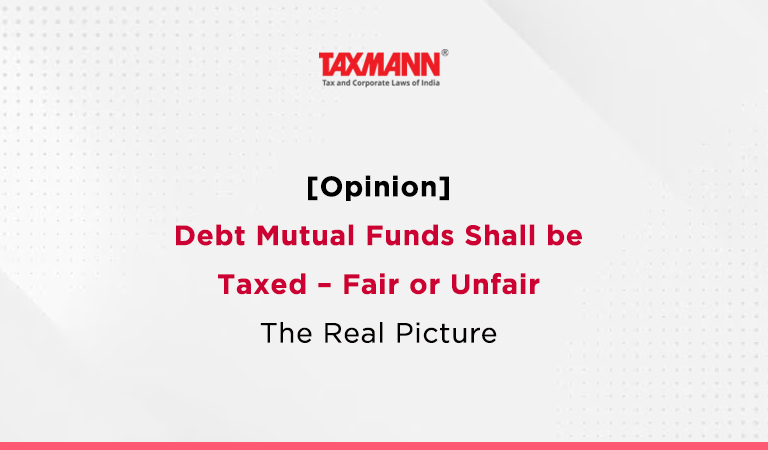[Opinion] Debt Mutual Funds Shall be Taxed – Fair or Unfair | The Real Picture
- Blog|News|Income Tax|
- 2 Min Read
- By Taxmann
- |
- Last Updated on 31 March, 2023

CA Divvya Gupta – [2023] 148 taxmann.com 435 (Article)
The Finance Minister of India undoubtedly caught the taxpayers off – guard by proposing an amendment in the session of Parliament in the Capital Gain head of Income for the Finance Bill 2023. It was a rather rough day at the Parliament when the Finance Ministry proposed to amend and make the Debt Mutual Funds taxable with effect from 1st April 2023.
What does this mean? Do we need to panic? Will we end up paying more tax?
Let me streamline the amendment for all of us but before that, let me tell you what Debt Mutual Funds are and why have they so far been a favourable mode of investment for all investors of all kind.
Salient Characteristics of the Debt Mutual Funds:
- It should also be noted that the Debt Mutual Funds provide the benefit of liquidity of funds to the investor.
- It allows to withdraw money whenever needed, therefore, not keeping any lock-in period clause.
- It is a tax deferral vehicle- if a person invests for 5 years, then that person shall not be liable to pay any tax on such debt mutual funds for 5 years. Hence, the taxability of the investor shall arise only after on the redemption after 5 years.
- It is flexible- it allows to set up your own Systematic Withdrawal Plan (SWP).
- They have more potential of better returns as compared to the traditional avenues.
- These are more stable as compared to the Equity funds and hence they provide a better preferred diverse portfolio to an investor.
Now, we shall proceed with understanding the applicability of the said amendment. Not all but only the Debt Mutual Funds that have an investment of less that 35% in Equity shall forgo their benefit of indexation. In other words, the Debt Mutual Funds that have investment of bare minimum of 65% in Equity shall be permitted to avail the benefit of indexation and shall continue to be taxed at 20% I the long run. Moving ahead, it now becomes essential to understand as to what rate is being proposed for the taxation of the Debt Mutual Funds which are not allowed to avail the benefit of taxation. Madam Nirmala Sitharaman ji has proposed a taxation of the Debt Mutual Funds at the income tax slab rate and it is further proposed to be treated as the Short Term Capital Gain, thus, disapproving the benefit of indexation.
Click Here To Read The Full Article
Disclaimer: The content/information published on the website is only for general information of the user and shall not be construed as legal advice. While the Taxmann has exercised reasonable efforts to ensure the veracity of information/content published, Taxmann shall be under no liability in any manner whatsoever for incorrect information, if any.

Taxmann Publications has a dedicated in-house Research & Editorial Team. This team consists of a team of Chartered Accountants, Company Secretaries, and Lawyers. This team works under the guidance and supervision of editor-in-chief Mr Rakesh Bhargava.
The Research and Editorial Team is responsible for developing reliable and accurate content for the readers. The team follows the six-sigma approach to achieve the benchmark of zero error in its publications and research platforms. The team ensures that the following publication guidelines are thoroughly followed while developing the content:
- The statutory material is obtained only from the authorized and reliable sources
- All the latest developments in the judicial and legislative fields are covered
- Prepare the analytical write-ups on current, controversial, and important issues to help the readers to understand the concept and its implications
- Every content published by Taxmann is complete, accurate and lucid
- All evidence-based statements are supported with proper reference to Section, Circular No., Notification No. or citations
- The golden rules of grammar, style and consistency are thoroughly followed
- Font and size that’s easy to read and remain consistent across all imprint and digital publications are applied



 CA | CS | CMA
CA | CS | CMA
